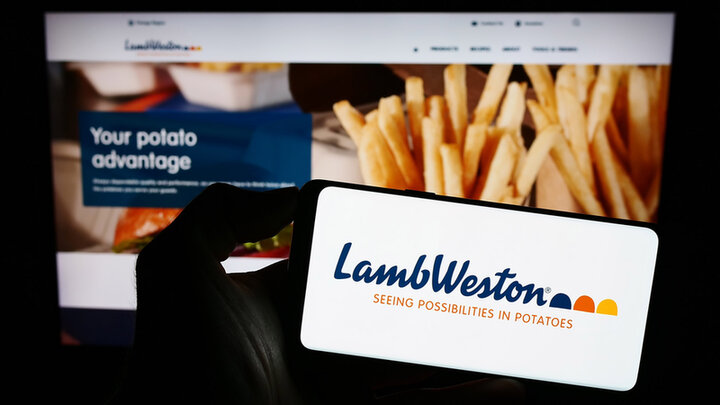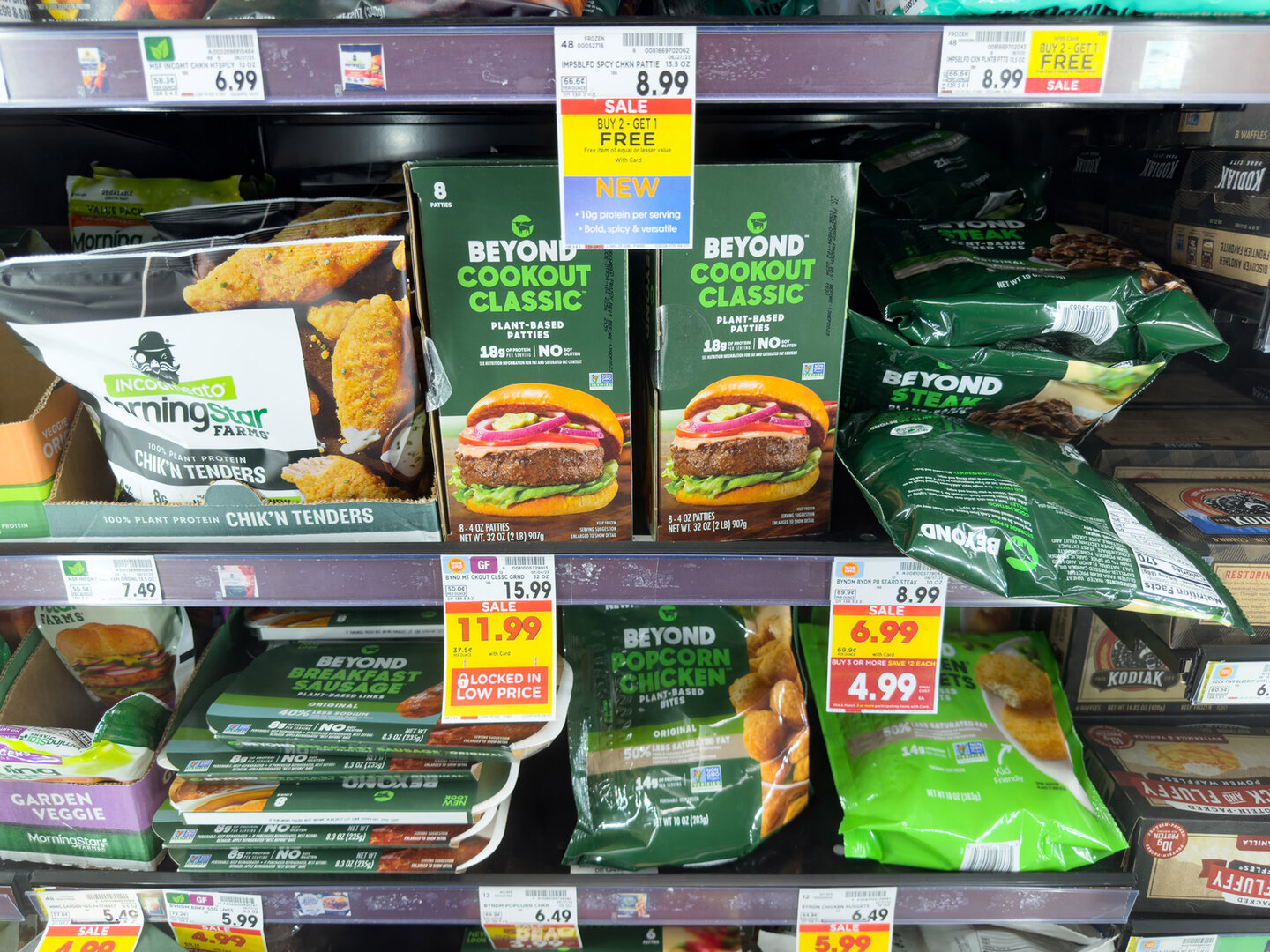Feature
Beyond Meat’s profit destiny still elusive
Beyond Meat has seen sales return to growth but, as Simon Harvey reports, the US alt-meat group is still looking to get back into the black.

Person holding cellphone with logo of US potato company Lamb Weston Holdings Inc. on screen in front of business webpage. Credit: T. Schneider
There were some positive takeaways in Beyond Meat’s third-quarter results but a return to profitability is a puzzle that’s unlikely to be solved any time soon.
Sales revenue rebounded after a run of nine quarterly declines, mainly led by price increases on “certain products” in US retail, while the gross margin flipped into positive territory with a sizeable gain.
Revenue was up in the US across all channels in the quarter to 28 September but it was a mixed bag in the international division, with a notable 17.2% drop in foodservice, offset by an increase of a similar magnitude in retail.
Denting any optimism from the results, however, was a slight downgrade in the top-end of Beyond Meat’s year-end guidance, which at best would put the plant-based business on course for its worst annual sales figures since going public in 2019.
More worryingly was a decrease in year-to-date revenue across all sales channels and regions, accompanied by an equally worrisome drop in volumes, particularly in an environment where demand for meat alternatives arguably remains fragile or even depressed.
And the doom continues for investors in the absence of profits, even as net losses and those for EBITDA narrowed in both reporting periods. Nevertheless, the former has never got out of the red in annual terms since the IPO and the last time the latter was shaded in black was the meagre $11.8m in 2020.
Beyond Meat founder, president and CEO Ethan Brown was unable to put his finger precisely on when the business may crawl back into profit but he did exude some optimistic tones discussing the results with analysts last week.
“You can see a very steep curve moving in the right direction and that’s why we feel so confident about our plan to bring the business into profitability,” Brown said as the adjusted EBITDA loss shrank to $19.8m in the quarter from $57.4m.
“I can’t say when. I don’t want to imply it’s going to be anytime soon but that is where we’re headed,” he told analysts.
“All of these trends you’re seeing – the growth, the increase in margin, the reduction in operating expense, and the substantial reductions in net loss and EBITDA loss – all move the business toward where we want it to be.”
Sub-head Subdued fourth quarter
To reach its revised $320-330m sales goal for 2024 ($320-340m previously) the plant-based meat, sausage and chicken nuggets business will need to generate another $70-80m over the final three months of the year, a tad below the third quarter’s $81m on the top side of the forecast.
Anything below last year’s sales revenue print of $343.4m will mark another annual decline for Beyond Meat. It has not registered growth since the 14% uptick in 2021 to $464.7m when adjusted EBITDA was a $112.76m loss.
Revenue so far this year has dropped 7.4% to $249.7m with EBITDA in the red at $75.6m.
The Nasdaq-listed company’s shares closed down 11% on 7 November at $5.84 as markets had the first opportunity to react to the numbers issued the night before. More drastically, they are down 36% this year, closing at $5.27 in New York yesterday (11 November).
“I’m fully expecting it but what we’re actually going to be saying is something different that we’ll have to get a lot of sign-offs on,” Brown responded when asked if analysts can ‘model’ for positive growth in 2025.
He added: “I like the direction of the business but it’s just way too early for us to model publicly what we think next year is going to look like.”
Downgrades ensue
Following Beyond Meat’s latest results, US investment bank William Blair downgraded the company’s EBITDA estimate for 2024 by $5m to a $90m loss and by the same magnitude for next year to a negative $60m.
The firm’s Jon Andersen wrote: “Our thesis is that Beyond Meat has the potential to deliver unique financial and societal benefits, given a large addressable market, remarkable plant-based meat products, and potential brand building and scale.
“However, we believe current pressures on the category could persist and the company’s pivot to cash generation and sustainable growth will take some time.”
Beyond Meat is betting on the latest IV reiteration of its signature burger and sausage to drive growth, incorporating avocado oil, products that have been developed to counter criticism over health credentials.
The weaponisation of the word process … has grown long in the tooth. It is past time we put it to bed.
Beyond Meat founder, president and CEO Ethan Brown
A fillet steak is soon to hit the market, too, made with mycelium, fava beans and a “limited number of natural ingredients”, Brown said, adding, “it’s a clean process”.
He fired a broadside at the critics of plant-based meat, who label the foods over processed. “The weaponisation of the word process, a tactic emphasised in the incumbent industry playbook on how to undermine plant-based meat and preserve the status quo, has grown long in the tooth. It is past time we put it to bed.
“We plan to do that by applying generous amounts of sunlight to our own process, educating consumers on how we build meat directly from plants.”
Margin improvement
Progress on margins was evident from Beyond Meat’s latest results statement, as the gross margin climbed to 17.7% in the quarter from a negative 9.6% a year earlier, with 300 basis points added from the previous three months. The outlook for 2024 remains in the “mid-teens range”.
In value terms, third-quarter gross profit rebounded to $14.3m from a $7.3m loss and increased to $31.6m from $1.2m over the nine months.
“Our first priority is getting leaner and more efficient. Though we have miles to travel, we are seeing proof points,” Brown said. “Part of our lean implementation is a narrowing of focus around products, markets, specific consumers and messages.”
Beyond Meat has also been consolidating in terms of co-manufacturers and trimming the number of warehouses to cut costs.
“We are now seeing the benefits in the form of reduced tolling fees, better asset utilisation and inventory management, the freeing up of working capital, increased overhead absorption, production and logistic efficiencies, and enhanced quality control,” Brown explained.
“I think we continue to show progress in the margin, particularly in ‘25, as we have an opportunity to make some smaller investments to increase efficiency in our plants.”
Capital raise
Nevertheless, a plan to raise additional capital this year caused a stir among analysts, particularly with $1.1bn of debt on its balance sheet and historical concerns over a cash burn, albeit Beyond Meat appears to be addressing that.
As Beyond Meat’s latest results statement showed, at the end of the third quarter, cash and cash equivalents stood at just shy of $135m. Meanwhile, cash used in operating activities through the year shrank to $69.9m from $79.3m.
Alexia Howard, a food analyst at US investment bank AllianceBernstein, suggested there are limits to what Beyond Meat might be able to raise on the market as she said guidance implies low single-digit growth in the final quarter.
While Howard applauded the return to top-line growth, she said the 7.1% volume decline in the quarter raises the “question of whether the category as a whole has truly stabilised”.
She added: “The company is looking to raise money before year-end, likely through its mixed shelf offering, allowing them to issue up to $250m, but with a market cap of circa $400m there is only so much it can raise to shore up its balance sheet.”
Asked to explain the detail, Brown said: “We’re not going to, at this point, get into how much we may be looking to raise before the end of the year. But I’ll just reiterate that, yes, we do intend to put additional liquidity on the balance sheet before the end of the year, and then we’re still looking at a more holistic sort of balance sheet restructuring at some point in the next year.”

Los Angeles, California, United States - 05-05-2023: A view of several packages of Beyond Meat products, on display at a local grocery store. Credit: The Image Party
John Baumgartner, a US-based managing director at Japanese investment bank Mizuho Securities, flagged similar concerns to Howard, noting resistance to pricing may be one factor that could result in “soft” fourth-quarter retail sales in the US.
And, he suggested, US industry data showing a 47th consecutive monthly decline (5%) in plant-based meat sales in September “limits prospects for an immediate recovery” for Beyond Meat.
Baumgartner added: “Absent capital resolution, we expect investor sentiment to remain cautious given an uncertain magnitude of equity dilution, which could prove significant.
“In addition, we’re focused on drivers that could further moderate cash burn, including incremental cost reductions and a faster/larger revenue improvement. We remain cautious on both factors, as Beyond Meat needs to balance growth resources with cost efficiencies.”
Beyond Meat, however, has secured some wins in distribution across retail and foodservice.
More Panda Express restaurants in the US have taken a punt, while Beyond Meat’s McPlant chicken nuggets have entered France with 1,500 McDonald’s outlets. Germany could also be significant as historical barriers over shelf-life requirements have now been overcome.
“Having worked for several years to meet shelf-life requirements, we are thrilled to now be in German retailers, Germany being one of the strongest, in my view, plant-based markets in the world,” Brown said.
“With a clear caution that it is very early days, we are seeing encouraging initial sell-through in this important market.”
That being said, Beyond Meat has been there before with fast-food chains, with some wins but some notable losses too, resting on the whims of consumers and their acceptance of meat-alternative products.
Retail is another case in point. Investors may have to be in it for the long term before Beyond Meat’s results statements show solid and consistent sales growth. And profitability may yet be somewhat of a mirage.
“We believe the company’s journey to sustained and self-funded growth will likely continue to be measured in quarters, as opposed to months, with the destination still uncertain,” William Blair’s Andersen wrote.